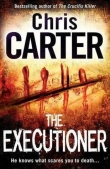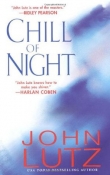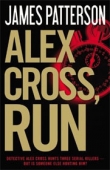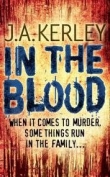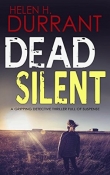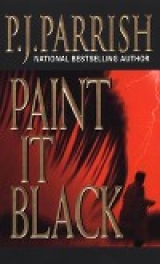
Текст книги "Paint It Black"
Автор книги: P. J. Parrish
Жанры:
Триллеры
,сообщить о нарушении
Текущая страница: 5 (всего у книги 20 страниц)
Chapter Eleven
Louis ducked under the Japanese lanterns and joined Wainwright and Dodie out on the lawn by the barbecue. Dodie was turning pieces of chicken. The sauce sizzled onto the coals, sending magnificent smells into the evening air.
Wainwright nudged Louis. “Can he cook?”
“I don’t know. Only food he ever offered me in Mississippi was a bowl of crawfish.”
Dodie glanced at him. “I never told you this, Louis, but you’re not suppose to eat the heads.”
Louis smiled. “I know that. Now.”
Wainwright looked confused and Dodie told the tale of how Louis bit off the head of a crawfish.
“Trying to impress me, he was,” Dodie said. “Well, better let this bird bake a few. Let’s go pop open some brews.”
They retreated to the patio and sat watching the sky darken, listening to the evening’s overture of frogs and crickets. Margaret came out, glanced at the three men, then went over to check the chicken.
“I just turned it, Margie.”
Margaret turned it again, then disappeared back into the house. Louis watched Dodie’s eyes as they followed her round body with open affection.
Wainwright sat forward in his chair. “Louis, you see this morning’s News-Press?”
Louis nodded.
“They’re calling it a racially motivated crime. A fucking anonymous source in the sheriff’s department,” Wainwright said. “Someone leaked it on purpose. They knew the reporter would jump on it.”
“But why would someone inside leak it?” Dodie asked.
“To put the screws on me, Sam,” Wainwright said. “Mobley wants the case and he knows if there’s enough pressure, I’ll have to give it to them.”
“That kind of talk is only gonna make everyone nervous,” Dodie said quietly.
“Just black men,” Louis said, taking a sip of beer.
“Well, do y’all believe that’s what it is?” Dodie asked.
Louis glanced at Wainwright, but he didn’t seem inclined to answer. “Racially motivated crimes are usually messages,” Louis said. “The offender is sending a message to a certain group that they are . . . unwelcome. The crimes are usually generalized and not normally filled with such rage.”
Wainwright was nodding. “Which is why I don’t think these murders fit. They seem personal somehow. My money’s still on Levon.”
“But you haven’t found any connection between the two men, have you?” Dodie asked.
“Just their race,” Wainwright said.
Louis hesitated. “It’s got to be more,” he said. “I think Tatum and Quick are connected, but only in the killer’s mind. They are symbols.”
“Of what?” Dodie asked.
“I don’t know. Maybe they are symbolic threats. Maybe the killer believes black men are taking something away from him, usurping his place.”
Margaret came back out and the three men remained silent while she gathered up empty beer bottles. When she was gone, Dodie spoke.
“How does this Levon fit in then?”
“I’m not so sure he does,” Louis said.
Wainwright took a drink of beer. “Well, I’m not ready to give up on Levon yet. He’s fucked up in the head. He’s capable of murder.”
“Levon doesn’t have motive. The why just isn’t there,” Louis countered.
Margaret came out onto the patio. “Sam, I’m almost ready in here. You keeping an eye on those birds?”
Dodie got up reluctantly and trudged out to the barbecue. Margaret went back inside.
“He wants to be included,” Wainwright said quietly, nodding after Dodie.
“I know,” Louis said. “I don’t know how much to tell him.”
“Have you told him about the details, like the black paint?”
Louis nodded. “But I explained that we’re keeping that from the press as a control.”
Wainwright nodded. They were silent for a moment.
“You know,” Louis said, “we have to consider the possibility that we have two perps.”
“We don’t have any evidence to indicate that.”
“We don’t have evidence to the contrary either,” Louis said. “The rain messed up the Tatum scene. And there was nothing at the overlook to say one way or the other.”
“The stab wounds are consistent with one killer. Same angle, same knife.”
Louis shook his head slowly. “That doesn’t mean someone else didn’t help. Most hate crimes aren’t committed by individuals. It’s usually a couple guys together.”
Wainwright gave a grunt and drained his beer. Dodie came back onto the patio.
“Couple of guys what?” Dodie asked, sitting down.
“Hate crimes,” Louis said. “It’s usually a group effort.”
“He’s right, Dan,” Dodie said. “These types are cowards and need to gather up their courage in packs. I mean, if I was you, I’d be looking for somebody with a hard-on toward black folk with a couple of buddies to help him out.”
“You got anybody like that around here?” Louis asked Wainwright.
Wainwright leaned back in the lawn chair. “A couple months ago, I arrested a guy named Van Slate.”
“What for?”
“He and two friends almost beat a black guy to death. It started at the Lob Lolly over on Pine Island. The black guy was with a white girl and Van Slate was shit-faced and made some remarks. They followed the couple out of the bar, tailed them back here, forced them off the road, and whaled on him.”
“Does Van Slate have a record other than this?” Louis asked.
“No, but he’s a hothead.”
“He lives here on Sereno?”
Wainwright nodded. “His father owns a big boatyard here on the key, and he’s had enough pull in the past to keep his kid out of jail.”
“I still can’t believe whoever killed these two men is living right here among us,” Dodie said quietly.
“Sam, you had killers living right next to you in Black Pool,” Louis said.
Dodie looked at his beer. “True enough.”
The crickets had stopped. It was quiet until a fish jumped out in the canal.
“Have you noticed the dates?” Wainwright said finally.
“What dates?” Dodie asked.
“Tatum was killed on Tuesday, March first. Quick was found on Thursday, nine days later, and the doc says he was in the water about two days.”
“Could be just a coincidence,” Louis said.
“Could be Tuesday’s the killer’s day off from his regular job,” Dodie interjected. “If he has one.”
Louis looked at him. “Well, Tuesday is three days away,” he said.
Wainwright drained his beer and sat forward. “Okay, this is what we’re going to do,” he said. “Louis, you check out Van Slate. We’ll put twenty-four-hour surveillance on the causeway to check every suspicious vehicle. If anyone sees anything, he’ll radio me to do a stop.”
“We don’t have the manpower,” Louis said.
“Chief Horton over in Fort Myers is a friend of mine and might lend some uniforms,” Wainwright said. “And I know my guys will do what it takes on our end.”
“I’ll pull a shift, Dan,” Dodie said quickly.
Wainwright paused and glanced at Louis. “Sure, I’ll fit you in, Sam.”
Wainwright pulled out his notebook and began to draw a diagram of the causeway and key. “Okay, we’ve got the Sereno Key causeway with two lanes going into the town center and—”
Margaret came back out carrying a platter. Wainwright fell silent. The three men looked up at her.
She gave them a stern look, then went out to get the chicken off the grill. She came back onto the patio, holding the platter, and paused, looking at them.
“You’d think y’all were CIA or something,” she said. “It’s not like I don’t know anything. I read the paper. I watch Hill Street Blues.”
Louis glanced at Wainwright, who lowered his head. Dodie sat very still. The silence lengthened.
Louis looked up at Margaret. “So, you think Furillo and Joyce will ever get married?” he asked.
Margaret smiled. “Yes, I do, and if y’all would get your butts inside to supper, I’ll tell you why.”
She went in. Louis glanced at Dodie, who looked mildly embarrassed. He looked at Wainwright. He was gripping his beer bottle, staring out at the black canal beyond, his face tight in the spare light of the Japanese lanterns.
Chapter Twelve
Louis stood outside the chain-link fence of the boatyard, watching Matthew Van Slate. If Van Slate had noticed him, he didn’t show it. He was up on a ladder, sanding the wooden hull of a sailboat that was propped on scaffolding. The yard was crowded with dry-docked boats—everything from beat-up bas-sers to a forty-foot white Hatteras that hung in a massive metal lift like some exotic captured bird. At the entrance was a large sign: VAN SLATE BOAT WORKS.
Louis opened Van Slate’s criminal folder. Van Slate and two other boatyard employees had been arrested last May by Wainwright’s officers for assault and battery on Joshua Zengo. Van Slate had served ten months of an eighteen-month sentence, and his two friends had served seven. According to Zengo’s girlfriend, the drunken Van Slate had picked a fight with Zengo in the bar, making racial slurs about him being with a white woman. The couple left, but about ten minutes later they noticed a car following them. Van Slate ran Zengo’s car off the road in Sereno and pulled him out of his car. The girlfriend said the three men beat Zengo unconscious before fleeing.
According to a witness statement from a patron in the bar, Van Slate was angry because his wife had recently left him and Van Slate suspected she was seeing a black man.
Louis closed the file and stared back at Van Slate. He looked to be about thirty, at least six feet, with a body honed by day labor and nights spent in a gym. He was wearing paint-stained jeans and an old denim shirt with the sleeves cut off. His knotty shoulders glistened in the sun and his oily blond hair hung over his forehead.
Louis could see two other men painting a hull. From what he could tell from the mug shots in the case folder, they looked to be Van Slate’s two friends. Louis tossed the file in the car and went through the gate.
“Matthew Van Slate?” he called as he approached him.
Van Slate looked down, the sander in his hand. His knuckles were dirty and raw, several scraped nearly to the bone.
“Who are you?” Van Slate asked, turning off the sander.
“Louis Kincaid. I’m working with the Sereno Key Police Department. I need to ask you a few questions.”
Van Slate’s eyes narrowed. “Get lost,” he said. He went back to his sanding.
Louis waited, knowing Van Slate would eventually turn around again. After almost a full minute, Van Slate looked back down at Louis.
“I thought I told you to get lost.”
“All you have to do is answer a few questions.” Louis could tell Van Slate was trying his damnedest to figure out who he was—and what authority he actually had here.
Finally, Van Slate set the sander on the ladder and climbed down. His eyes locked on Louis, and he reached into his back jeans pocket for a cigarette. Louis waited while he lit it. The pungent smell of paint thinner drifted on the breeze.
“Be careful, you might go up in flames,” Louis said.
Van Slate slipped the lighter back in his pocket and blew out smoke. “Okay, what?”
“Two black men were found murdered here in the last month. Both were beaten. You heard about it?”
“Why would I care?” Van Slate’s lips, gripping the cigarette, barely moved when he spoke.
“Past history.”
Van Slate pointed the cigarette at Louis. “Look, that shit with my old lady is over with. I don’t care anymore how many—who she fucks.” Van Slate looked at the gravel, then out over the yard. “I got a new life now.”
“Must be hard, though.”
“What?”
“Your buddies still talk about it?”
Van Slate’s eyes drilled into Louis. “Get the fuck out of here.”
Louis glared back, feeling a surge of anger. Van Slate stepped forward. For a second Louis thought he was going to hit him and he braced himself.
“You’d like to kick my ass, wouldn’t you?” Van Slate said.
“Yeah,” Louis said.
“But you can’t. Cops got rules. Too bad.”
Van Slate took a drag from his cigarette. Louis focused on Van Slate’s bruised knuckles. Images of Anthony Quick’s battered face came to his mind. He inhaled and forced his words out evenly, meeting Van Slate’s eyes.
“Where were you a week ago Tuesday, about six-thirty P.M.?”
Van Slate shook his head. “I don’t have to talk to you.”
“You’ll talk, Mr. Van Slate. If not to us, then to the sheriff’s department.”
“You fucking people . . .” Van Slate muttered, turning away.
Louis reached out and hit his shoulder, spinning him around. “What?”
Van Slate stared at him, shocked, then smiled. “Cops. You fucking cops.”
Over Van Slate’s shoulder, Louis noticed the two friends staring at them. Van Slate followed his gaze, then said, “Touch me again and they’ll be all over your ass, you son of a bitch. This is my boatyard. There’s not one fucker in here who will come to help you. You understand that?”
Van Slate’s friends were edging forward. Louis resisted the urge to look around.
“Don’t threaten me, Van Slate,” Louis said. Cops have rules. Little did this asshole know.
Van Slate flicked the ashes of his cigarette at Louis and they landed on his chest.
“I don’t feel sorry for either of those two . . .” Van Slate deliberately let his voice trail off, eyeing Louis.
Louis reached out and threw an arm around Van Slate’s neck, spinning him into a quick choke hold and backing up against the boat so he could see the other two across the yard.
“This is police brutality. I’ll report your ass,” Van Slate hissed.
Louis pulled tighter, keeping his eyes on Van Slate’s friends. “I’m going to ask you again. Where were you last Tuesday night?”
Van Slate gagged. “I was at home, watching a basketball game.”
“Who was playing?”
“Shit, I don’t remember. I was drinking. Let me go, you’re fucking choking me.”
“Anyone with you?”
Again, silence.
“Anyone with you?” Louis shouted, jerking on Van Slate’s neck.
“Yeah! Both of them guys. Now let me go!” Van Slate yelled, bucking against him. Louis released him and Van Slate stumbled away. He spun back to face him.
“I’ll have your fucking badge!” he screamed.
Louis watched the friends, who suddenly didn’t look too eager to deal with a cop.
“Good luck,” Louis said.
“I’ll see you again!” Van Slate shouted. “You can bet on that!”
“I’ll be holding my breath.”
Louis walked toward the gate, hearing the crunch of his shoes on the gravel, listening for a rush of bodies behind him. But there was nothing except the beating of his heart and the clang of the boatyard gate as he slammed it behind him.
Chapter Thirteen
Louis drove aimlessly, turning the encounter with Van Slate over in his head. Van Slate didn’t seem too bright. Most likely, Van Slate senior ran the office, leaving junior to bust his nuts sanding hulls. It occurred to Louis suddenly that the hull of the huge white Hatteras was painted a nice shining black. Vince Carissimi still hadn’t reported back on whether the Krylon can found near Tatum matched the paint on Anthony Quick’s body. Maybe it wasn’t spray paint after all. He made a mental note to bring it up to Wainwright.
Louis glanced at his watch. Just after nine-thirty. He decided to go check in with whoever was pulling surveillance on the causeway.
Louis spotted Officer Candy’s face behind the wheel of a Toyota in the small parking lot nearby where fishermen routinely left their boat trailers. Candy was sifting through that morning’s News-Press, looking tired after what was probably a long and boring shift. He smiled as he saw Louis approach.
“You didn’t bring any coffee, did you?” Candy asked.
“Sorry, man,” Louis said, leaning into the window. “Anything going on?”
Candy yawned. He was in civvies and looked like a tourist, not a cop. “Not a thing. We had four cars come over all night and I knew every one of them.”
A Cadillac came by and Candy eyed the occupants: an elderly couple with a Chihuahua hanging out the window. He dutifully recorded their Palm Beach County tag number as they passed through.
“You here to relieve me?” Candy asked hopefully.
“Sorry,” Louis said. “I’m thinking of heading over to Fort Myers Beach to talk to the hotel clerk.”
Candy nodded and looked out over the sun-silvered bay. “You really think we’re gonna catch this guy?” he asked.
“We’re going to try,” Louis said. He slipped his sunglasses on. “Later, man.”
Traffic was light on the mainland but twice Louis had to resort to the map spread on the passenger seat. The map had been his bible in the last two weeks as he labored to familiarize himself with the area. Fort Myers wasn’t a big town by any standard, but he had managed to get lost in its tangle of two-named streets, subdivisions, and waterways.
Water . . . it seemed to touch everything here. Dodie had told him that life here revolved around the water, that you were never very far from it, what with the gulf, the Caloosahatchee River, and all the bays and inlets. What God or glaciers hadn’t carved out, man had added, with canals and waterways that interlaced every neighborhood.
Back in Michigan, water had been a simple thing he had never given much thought to—rivers, lakes, and creeks. But here—here, water was like a pantheon of exotic-named deities.
He had noticed it back at the 7-Eleven when he stopped to get coffee and study the map in an effort to figure out the easiest way over to Fort Myers Beach. He had never seen so many different names for bodies of water. It was like he had heard about Eskimos having a hundred different names for snow.
Hell Peckish Bay. Matlacha Pass. Hardworking Bayou. Pine Island Sound. Buck Key Channel. Big Dead Creek. Old Blind Pass. Kinzie Cove. Gator Slough. The Rock Hole. The Mud Hole. Long Cutoff. Short Cutoff. Glover Bight.
What the hell was a “bight” anyway?
It took one more look at the map before he found San Carlos Boulevard, the main drag leading to Fort Myers Beach. He drove through a commercial clot of marinas and stores, then over a high graceful bridge that deposited him onto the long narrow spit of land that formed the town of Fort Myers Beach.
Louis had to slow the car to a crawl as he started down congested Estero Boulevard.
Fort Myers Beach had little in common with its namesake city on the mainland and even less with Sereno. Out on the key, a glimpse of blue water and sky was never out of eyesight and the loudest noise was the squawk of a gull. Fort Myers Beach was a carnival crush of hotels, T-shirt shops, and fast-food joints. The sidewalks were choked with seared-skinned tourists who waddled along with the stomach-full, head-empty gaits of winter parolees. The air smelled of sea spray, caramel apples, pizza, and Coppertone.
Louis spotted the Holiday Inn and pulled in.
He parked under a palm and got out, his eyes scanning the crowded lot. It was black asphalt, freshly repaved, the oily smell baking in the sun. Most of the cars were basic sedans with out-of-state or lease plates.
The sheriff’s deputies had already questioned the hotel clerk and told Wainwright that nothing had come of the interview. Louis wasn’t sure what he expected to get out of the clerk, maybe some vibration someone else had missed.
A young man with neatly cropped hair looked up at him as he approached the front desk. His brightness quickly faded.
“Oh, man, another cop?”
“How’d you know?”
“Maybe it’s the walk.”
Louis smiled. “Sereno Key.” He glanced at the kid’s name tag. “You’re Kevin Grunow?”
“One and the same.” He sighed. “Look, I told everything I know to the other guys.”
“I’m just here to clarify some things,” Louis said.
Kevin stood up straight. “Okay. I was on duty that afternoon. I had just gotten off, around eight, and I heard a bang.”
“Go on.”
“I figured it was a car backfiring and I just forgot about it until the police showed up a week later. My boss called me in and they asked me what I saw. But I saw nothing, nada, zilch.”
“Do you know if there were any other witnesses?”
Kevin shrugged. “This is a hotel, man, people come and go. We were busy that weekend because of that computer convention. The boss gave them a list of everyone who was registered. I guess you’re trying to track them all down for questioning, huh?”
Louis nodded. Luckily, the kid wasn’t bright enough to figure out the sheriff’s department and Sereno Police Department weren’t the same thing. Most civilians weren’t.
“I made copies,” the kid said suddenly. “You need one? I got the guy’s phone list, too.”
“That would be helpful to us, Kevin.” Blind dumb luck.
Kevin disappeared and came back a few seconds later with a copy of a computer printout. Louis glanced at the phone list. Quick had made four calls, all back to his home in Toledo. Nothing.
“Anything unusual about Mr. Quick, Kevin? Did he have any visitors? Put anything in your safe?”
Kevin shook his head. “Not that I know of.”
Louis folded the papers and glanced around the lobby. “I understand Mr. Quick asked about going fishing the morning he was killed. Do you know where?”
“Well, there’s lots of fishing around here.”
“Such as?”
“You could do back bay, where you hire a guide. Or you can go on one of the charters that go out to the gulf. Or you could just go down to the pier and rent a pole.”
“What do most tourists do?”
“Charters. I think I remember him looking at those brochures.” He pointed to a rack behind Louis.
Louis plucked out the four brochures on fishing charters. There were trips on everything from small skiff rentals to large overnight charters that went to the Keys. Most of the charter boats were located at Fisherman’s Wharf, near the bridge he had passed over that led to the beach.
He thanked Kevin and left. As he backtracked to the bridge, he had a sinking feeling that this, like the trip to see Van Slate, was going to be another waste of time. If Quick had shown up at Fisherman’s Wharf, the sheriff’s deputies probably had it covered. Besides, there was no proof Quick had gone fishing the day he died. The check Wainwright had run on Quick’s credit cards had revealed no charges to fishing boats. And as the hotel clerk pointed out, Quick could have gone to any number of places to fish. To top it all off, Quick’s car was found back at the hotel.
The docks fronted a narrow baylike body of water that faced Fort Myers Beach. The slips were crowded with boats: fancy sailboats, fishing skiffs like Dodie’s, and at the far end a couple of shrimp boats, great hulking contraptions festooned with nets and huge poles extending outward like antennae.
Louis scanned the charter boat office and bar that fronted the docks. The office was closed but there was music and laughter coming from the bar.
He started by showing Anthony Quick’s picture at the bar, but no one could remember seeing him. Back outside, there was only one charter boat in dock, a beat-up-looking tub with a sign announcing CAP’T ED’S FISHING CHARTERS.
It appeared deserted but as he drew closer, Louis heard a banging sound inside the cabin.
“Hey! Anyone around?” he called out.
It took some more yelling before a man emerged brandishing a hammer. He was squat and bandy-legged, wearing grimy cutoffs and worn Docksiders. His bare chest was suntanned to a dark mahogany, his sparse hair bleached out to white.
“Ain’t hiring out today,” the man said.
Louis came forward. “I’m not here for fishing. I’m looking for some information.”
The man squinted up at him. “Oh, yeah? ’Bout what?”
Louis held out Quick’s photo. “You ever seen this man?”
The man didn’t move. “You a cop?”
“Yes.”
“What’d he do?”
“Nothing.” Louis extended the photo. “You seen him around here in the last two weeks?”
Slowly, the man came forward and took the picture, glanced at it, and held it out. “Nah. Never seen him.”
Louis took it back. “He was a tourist. You’re sure?”
The man shrugged. “Hell no, I ain’t sure. We get lots of tourists down here. I can’t say for certain he wasn’t one of them.”
Louis slipped the photo back in the file. “How many other boats are usually here?”
“Five of us. We come back ’bout four-thirty. I’d be out myself if it weren’t for the damn generator.”
Louis’s eyes wandered over the empty slips. Shit, he would have to come back. He started to his car, then doubled back to the bar and ordered a hamburger and beer. He stood at the open bar, sipping a beer and watching a large brown pelican waddle down the dock. There was a stink of rotting fish in the air. Louis thought of Dodie, who had been bugging him to go out fishing. As long as he lived, he would never understand the allure of sitting for hours waiting for a damn fish to bite.
He finished eating and returned to the parking lot. He was about to get in the car when he noticed a ramshackle wooden structure on the far edge of the lot. It had a loading dock open to the parking lot and a rusted corrugated-roof carport filled with junk. Fishing nets were strung below a sign that said DIXIE FISH CO. WHOLESALE AND RETAIL. WE SHIP UP NORTH. There was a toilet on the dilapidated porch. It was planted with bright pink geraniums.
Louis trudged up the steps and pushed open the screen door.
It was dark as a cave inside, except for a lighted refrigerator case. Behind the frosted glass, Louis could see slabs of fish and piles of pink shrimp. The weathered plank walls were covered with bumper stickers, pictures, and junk.
“Howdy.”
The voice was husky female. Squinting, Louis made out a figure silhouetted against the far open window. He went forward and she came into view.
Medium height, shapely, blond hair piled on her head, hand propped on cocked hip. And very large tanned breasts barely covered by a bright pink bikini top.
He had to struggle to keep his eyes on her face. She noticed and gave him a smirky smile.
“You want something?” she asked.
He pulled out Quick’s photo. “Have you seen this man around here?”
She didn’t even look at the picture. Her smile faded. “I got fish. You want fish?”
“Not really. I—”
She turned away, grabbing a remote and aiming it at the wall. The place filled up with the sound of Charlie Parker’s buttery sax.
“Okay, okay!” Louis yelled.
She punched the remote, lowering the volume, and looked back at him.
He glanced at the glass fish case. “Give me some shrimp.”
“How much?”
When he hesitated, she sighed. “How many you feeding?”
“Three,” he said.
“What size? We got small, medium, and jumbo.”
“You decide.”
She smiled and moved languidly to the case. He could see her breasts clearly in the light of the case as she shoveled the shrimp, but not her face. She plopped a plastic bag down on the counter. “That’s forty-five bucks.”
“What?”
“They’re jumbos, hon.”
Louis dug into his pocket and pulled out two twenties and a ten. “Keep the change,” he said.
She gave him a smile as she deposited the money in a drawer. His eyes were getting used to the dim light. She wore her ponytail high on her head like that little girl in the Flintstones cartoon. She could have been eighteen or forty; he couldn’t tell.
“I hate cops,” she said.
“Most people do,” Louis said. He held out the photo. “This man might have been here about two weeks ago. Did you see him?”
She glanced at it, shrugged, and turned away, bending down to pick up some paper, making sure Louis got a prime view of her ass in the tight cutoffs.
“How’s business?” he asked.
It took a moment, but she smiled. “Beats flipping burgers in a hair net at Wendy’s. I get a lot of men customers off the boats.”
“I don’t doubt it.” Louis held out Quick’s photo again.
“I saw him,” she said.
“Are you sure?”
“Positive. I’m here every day and I notice things.”
“How do you know it was him?”
She shrugged. “We don’t get many black guys coming in here. But this guy I remember. He had just come in off a charter and he came in here to buy some fish to ship home.”
“Why would he buy fish?”
She smiled. “ ’Cause he didn’t catch anything and he wanted to send a big fish home to impress his kids.”
“Do you know what boat he chartered?” Louis asked.
She shook her head. “They all get back in around four-thirty or so.”
“Thanks. I’ll be back.” Louis picked up the bag of shrimp. At least he’d have something to take back to Margaret for dinner. He started to the door.
“You’re the first, you know,” she said.
“The first what?”
“The first cop I told this to.”
Louis stepped back toward the woman. “Did the sheriff’s deputies come talk to you?”
“They talked to me. But I didn’t talk to them.”
“Why not?”
She smiled. “They didn’t buy my jumbos.”
